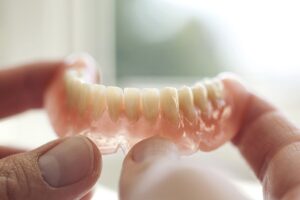 If you are missing a few of your teeth, you may be a good candidate for dentures. Dentures are prosthetic devices used to fill in the gaps left by missing teeth. They consist of artificial teeth, which are typically made of strong and natural looking dental porcelain. In the case of traditional dentures, the artificial teeth are attached to an acrylic base, which is designed to resemble your natural gum tissue. For patients with implant-supported dentures, the artificial teeth are secured to dental implants, which are surgically placed within the jawbone. At Harmony Dental Care, Dr. Kalil Abide offers both traditional and implant-supported dentures. To find out if you are a good candidate for dentures, contact our Jackson, MS practice today.
If you are missing a few of your teeth, you may be a good candidate for dentures. Dentures are prosthetic devices used to fill in the gaps left by missing teeth. They consist of artificial teeth, which are typically made of strong and natural looking dental porcelain. In the case of traditional dentures, the artificial teeth are attached to an acrylic base, which is designed to resemble your natural gum tissue. For patients with implant-supported dentures, the artificial teeth are secured to dental implants, which are surgically placed within the jawbone. At Harmony Dental Care, Dr. Kalil Abide offers both traditional and implant-supported dentures. To find out if you are a good candidate for dentures, contact our Jackson, MS practice today.
Requirement #1: Several Missing Teeth
Patients that wear dentures are missing several teeth. Dentures may be appropriate if you have:
- Lost all of your teeth on your upper or lower arches
- Lost all of your teeth
- Several missing consecutive teeth
- Teeth that are missing from different quadrants of the mouth
If you are missing all of the teeth in your upper or lower arches, or are missing all of your teeth, you may be a good candidate for full dentures. If you are missing a group of teeth from one area of your mouth, or are missing teeth in several different areas of the mouth, you may be a good candidate for partial dentures.
Requirement #2: Good Oral Health
In order to be fit with dentures, the teeth and gums should be in good health. For patients with several missing teeth, they may need to undergo restorative dentistry treatments to improve the health of the teeth and gums. For example, if the patient has a cavity or root canal infection, the diseased portions of the teeth will need to be restored before dentures treatment can begin. If the patient suffers from gingivitis or periodontitis, the gum infection will need to be treated and controlled before dentures treatment can begin. Finally, if the patient’s jawbone has degenerated as a result of tooth loss and poor dental habits, the patient may need to undergo a bone rebuilding procedure before dentures treatment can begin; bone grafting procedures are more likely to be recommended to patients being fit with implant-supported dentures. Once the structures of the mouth are in good health, the patient can be fit with dentures.
Traditional vs. Implant-supported Dentures
Dr. Abide offers traditional and implant-supported dentures to patients. The option that is right for you depends on your particular needs and preferences.
Traditional dentures are ideal for patients who wish to undergo treatment that is quicker, less costly, and minimally invasive. With traditional dentures, patients typically do not require oral surgery to place the implants, and can therefore forego the three to six-month recovery period that is required after surgery. Traditional dentures are also less expensive and non-invasive, since patients do not require a surgical procedure.
Implant-supported dentures are ideal for patients that desire the most natural looking and stable restoration possible. Because the dentures are anchored to surgically implanted titanium posts that mimic the natural tooth roots in function, the denture prosthetic rests directly on the gum line and is held securely in place.
To find out if dentures are right for you, contact Harmony Dental Care today.